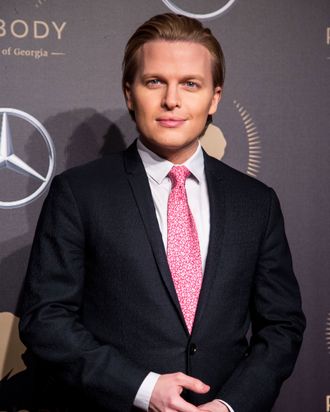
Little, Brown holds one of the more elaborate meet-the-authors lunches at BookExpo, the annual publishing trade show taking place at the Jacob Javits Convention Center this week. A preview of the big fall writers on the publisher’s slate, it isn’t a function given to big surprises. This year, there was a good mix of celebrated writers (Gail Collins, Amy Waldman), interesting debuts (Dan Kois’s How to Be a Family), as well as the requisite celebrity ringer (Jenny Slate, pitching a collection of micro-essays). The authors had given their talks and fanned out to the the tables when Ronan Farrow emerged from behind a curtain and ambled onto the dais.
“Temperature good, everyone hydrated?” asked Farrow, the son of Mia Farrow, and the reporter who broke one of the big stories about Harvey Weinstein’s abuses, thus midwifing #MeToo. He’d popped in, hair gelled back and skin sparkling, to tease a book that, unlike the others, isn’t even finished yet. (“I promise it’ll be done someday,” he said.) It does have a title, Catch and Kill, and Farrow added a few details to what’s publicly known about it.
It’ll be more than just “many articles’ worth of that precise, dry almost legalistic reporting” he did for The New Yorker, which published his scoop after his former employer, NBC, killed the story. “It is also a book story because it is emotional and, I hope and pray, honest, and because if I do my job right it will transport you and stand as something immersive that tells you what it’s like to be in the center of the great mystery of my life.”
Farrow didn’t name NBC. (Awkwardly, a Today show producer was among the attendees.) But he recalled NBC’s decision to drop him as a personal rock bottom you’ll hear much more about in the book. “I can’t tell you all the details of what’s in there yet, but I can tell you about some of the low points emotionally that I’m now reliving.”
His NBC contract wasn’t renewed, and a publisher he wouldn’t name dropped a book contract, too. “I had moved out of my home because of threats to me, I was being followed, I was fielding personal legal threats from an incredibly powerful and wealthy person who said he would use the best lawyers in the country to wipe me out.” Nor was he the defiant hero fighting the odds, at least not in the moment. “I wish I could tell you that I swaggered into a room and lowered my shades and said, ‘Over my dead body I’ll stop reporting!’ That would be the movie version, and someone more handsome would play me, but it’s not how it went.”
The notion of a handsomer Farrow is absurd; be that as it may, he had a rough go. “There was a moment at the very height of it when I was in a cab going from a meeting with one source to a meeting with another, and I just learned that I might very well be scooped by the competition, and I remember just breaking down completely and calling my poor long-suffering partner.” He wailed into the phone about risking everything and having nothing to show for it. Snot poured out of him. His partner “was very good with me. He said, ‘You haven’t slept in a long time, we’re gonna talk about this, and you’re gonna tip your taxi driver very well.’ The taxi driver’s name was Omar, and he was very emotionally supportive.”
Farrow also promised fresh reporting about the shortcomings of the legal system and the media that suppressed the Weinstein story for more than a dozen years before it ever affected his own life. Then he thanked the assembled publishers, press, and booksellers and went back behind the curtain whence he’d emerged.
The authors returned to pitching their own books as the attendees discreetly forked their chicken and refilled their wine. But the writer at my table couldn’t help polling us; didn’t Farrow look a lot like Frank Sinatra?

